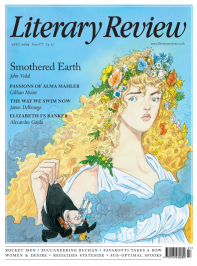Max Norman
You Say Women, I Say Wimmen
The Dictionary Wars: The American Fight over the English Language
By Peter Martin
Princeton University Press 358pp £24
In one of the great coincidences of history, Samuel Johnson Jr – no relation to his English namesake – compiled America’s first dictionary. The first American dictionary, however, was produced by Noah Webster, born one year after Johnson and a few miles south of him on a farm near Hartford, Connecticut. Hot-blooded and indefatigable, Webster was the self-proclaimed ‘prophet of language to the American people’ and a sworn enemy of Dr Johnson. In his 409-page Dissertations on the English Language (1789), a linguistic Declaration of Independence, Webster called the English lexicographer ‘the insidious Delilah by which the Samsons of our country are shorn of their locks’. If it were to be a proper nation, America would need to shrug off its cultural inferiority complex, acutely felt by the Founding Fathers and gleefully reinforced at every opportunity by the carping British commentariat. As Ralph Waldo Emerson put it some fifty years later, there was a need to ‘extract the tape-worm of Europe from America’s body’.
Webster rose to the occasion with a reformer’s zeal: ‘Let us then seize the present moment, and establish a national language as well as a national government,’ he wrote in his Dissertations. The problem was that Webster, though indoctrinated at Yale in the ideology of American greatness and

Sign Up to our newsletter
Receive free articles, highlights from the archive, news, details of prizes, and much more.@Lit_Review
Follow Literary Review on Twitter
Twitter Feed
Richard Flanagan's Question 7 is this year's winner of the @BGPrize.
In her review from our June issue, @rosalyster delves into Tasmania, nuclear physics, romance and Chekhov.
Rosa Lyster - Kiss of Death
Rosa Lyster: Kiss of Death - Question 7 by Richard Flanagan
literaryreview.co.uk
‘At times, Orbital feels almost like a long poem.’
@sam3reynolds on Samantha Harvey’s Orbital, the winner of this year’s @TheBookerPrizes
Sam Reynolds - Islands in the Sky
Sam Reynolds: Islands in the Sky - Orbital by Samantha Harvey
literaryreview.co.uk
Nick Harkaway, John le Carré's son, has gone back to the 1960s with a new novel featuring his father's anti-hero, George Smiley.
But is this the missing link in le Carré’s oeuvre, asks @ddguttenplan, or is there something awry?
D D Guttenplan - Smiley Redux
D D Guttenplan: Smiley Redux - Karla’s Choice by Nick Harkaway
literaryreview.co.uk